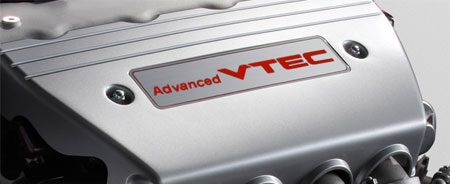
Honda has announced it’s next generation VTEC engine, the Advanced VTEC engine (AVTEC) which will make it’s debut in a production car within the next three years. Honda’s new Advanced VTEC (AVTEC) engine combines continuously variable valve lift and timing control with the continuously variable phase control of valve timing to achieve a good combination of better performance, fuel economy, and lower emissions. This is an improvement over the i-VTEC system which has preset changeover settings in valve lift – the new AVTEC system can adjust the valve lift continuously. There is also a variable-length intake manifold to improve intake airflow.
 The Advanced VTEC (AVTEC) system allows optimum control over intake valve lift and phase in response to driving conditions for a significant increase in torque across the engine rev range. Under low and medium loads, the valves are set to have low lift and early closure – this reduces pumping losses and subsequently improves fuel economy.
The Advanced VTEC (AVTEC) system allows optimum control over intake valve lift and phase in response to driving conditions for a significant increase in torque across the engine rev range. Under low and medium loads, the valves are set to have low lift and early closure – this reduces pumping losses and subsequently improves fuel economy.
The new AVTEC system will allow for a 13% improvement in fuel economy over the current i-VTEC range of engines. The 13% figure was obtained comparing the current K24A 2.4 litre i-VTEC engine with a new 2.4 litre AVTEC equivalent. Emissions are compliant with US LEV2-ULEV standards and Japanese Low-Emission Vehicles standards with levels 75% lower than 2005 standards.
Looking to sell your car? Sell it with Carro.




















AI-generated Summary ✨
Comments express excitement and curiosity about Honda's new AVTEC engine, highlighting its potential fuel efficiency improvements and technological advancements over previous VTEC systems. Many users compare AVTEC favorably to other brands' variable valve timing technologies like VVTi, VVTL-i, and CVT, praising Honda’s continuous innovation. Some comments question whether AVTEC will be used in upcoming models like the Civic or Accord. There is also a recurring theme of frustration with Proton's slow progress and lack of comparable advanced engine technologies, with critics emphasizing Honda’s ongoing improvements and global recognition. Overall, sentiments are positive toward Honda's progress, while others criticize Proton’s perceived lag and reliance on outdated technology. Some off-topic political and car brand comparisons occur but are filtered out.